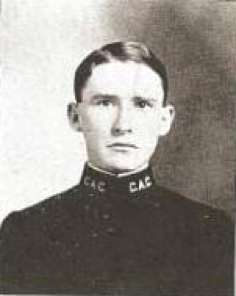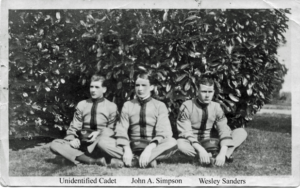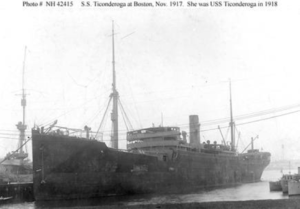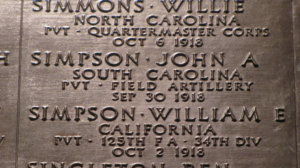Scroll of Honor – John Adam Simpson
On the Way Over There
John Adam Simpson came to Clemson College in 1912 when  both he and the school were still young. “Simp” had grown up in Chester County, attending the public schools in Richburg. He majored in agriculture and was a member of the Calhoun Literary Society, the YMCA, Agriculture Club, and the Clean Sleeve Club. Simp graduated with the Class of 1915, but his time on campus had not come to an end. Based on his reputation as “accurate, steady and dependable as well as willing and conscientious,” Simp was offered a graduate assistantship in botany.
both he and the school were still young. “Simp” had grown up in Chester County, attending the public schools in Richburg. He majored in agriculture and was a member of the Calhoun Literary Society, the YMCA, Agriculture Club, and the Clean Sleeve Club. Simp graduated with the Class of 1915, but his time on campus had not come to an end. Based on his reputation as “accurate, steady and dependable as well as willing and conscientious,” Simp was offered a graduate assistantship in botany.
Simp left Clemson in July 1916 taking a new position as the assistant to the director of the South Carolina Experiment Station. Two years later, with the United States now committed to the war in Europe, he resigned his position to join the Army and was assigned to the 4th Battery, Field Artillery at Camp  Jackson in Columbia. Private Simpson was assigned to headquarters as an observer and map maker. Simpson and his unit left Camp Jackson on September 15 for their deployment overseas.
Jackson in Columbia. Private Simpson was assigned to headquarters as an observer and map maker. Simpson and his unit left Camp Jackson on September 15 for their deployment overseas.
Ironically, Simpson and his comrades would be sailing to France to fight the Germans on a German ship. The steamship Camilla Rickmers had been built at Bremerhaven, Germany in 1914. When the United States declared war on Germany in April 1917, the ship was seized by US Customs officials and turned over to the Navy. The Navy fitted the ship out as an animal transport, renamed her Ticonderoga, and commissioned her at Boston on January 5, 1918 with Lieutenant Commander James J. Madison in command.
Ticonderoga loaded her Army cargo at Norfolk, Virginia and  then sailed north to New York to join a convoy of ships bound for France. On September 22, the transport, with Simpson onboard, cleared New York harbor and sailed east. A week later, Ticonderoga developed engine trouble and began to fall behind the protective screen of the convoy. At 0520 on September 30, Ticonderoga sighted the German submarine U-152 stalking her on the surface. Lieutenant Commander Madison ordered his ship cleared for action.
then sailed north to New York to join a convoy of ships bound for France. On September 22, the transport, with Simpson onboard, cleared New York harbor and sailed east. A week later, Ticonderoga developed engine trouble and began to fall behind the protective screen of the convoy. At 0520 on September 30, Ticonderoga sighted the German submarine U-152 stalking her on the surface. Lieutenant Commander Madison ordered his ship cleared for action.
U-152 attacked from five hundred yards away using its two 5.9 inch deck guns. Its first shot struck Ticonderoga’s bridge. By the sixth shot, the skillful German gunners had knocked Ticonderoga’s forward gun out of action. Still the battle continued, as Ticonderoga’s aft gun engaged the raiders. Almost every man aboard had been wounded, including Madison who had himself placed in a chair on the bridge from where he continued to maneuver his ship and direct his gunners.
After a two hour fight, with Ticonderoga now ablaze and  many of her lifeboats holed by German shell fire, the order was given to abandon ship and at 0745, Ticonderoga slipped beneath the waves. Of the 237 sailors and soldiers onboard, only twenty-four survived. Two, including the ship’s executive officer, were picked up by U-152 and taken to Kiel, Germany as prisoners-of-war. The rest, including the badly wounded Madison, survived four days in a boat before being rescued by a British steamer. Lieutenant Commander Madison, who would lose his leg as the result of wounds, was awarded the Medal of Honor—and spent the remainder of his short life in the hospital, dying in 1922.
many of her lifeboats holed by German shell fire, the order was given to abandon ship and at 0745, Ticonderoga slipped beneath the waves. Of the 237 sailors and soldiers onboard, only twenty-four survived. Two, including the ship’s executive officer, were picked up by U-152 and taken to Kiel, Germany as prisoners-of-war. The rest, including the badly wounded Madison, survived four days in a boat before being rescued by a British steamer. Lieutenant Commander Madison, who would lose his leg as the result of wounds, was awarded the Medal of Honor—and spent the remainder of his short life in the hospital, dying in 1922.
John Simpson was one of the men whose remains were never recovered. Never married, Simpson was survived by his father John and mother Elizabeth. He is memorialized on the Memorial Marker at Suresnes American Cemetery outside Paris.
For more information about John Adam Simpson see:
http://soh.alumni.clemson.edu/scroll/john-adam-simpson/
For additional information about Clemson University’s Scroll of Honor visit:
